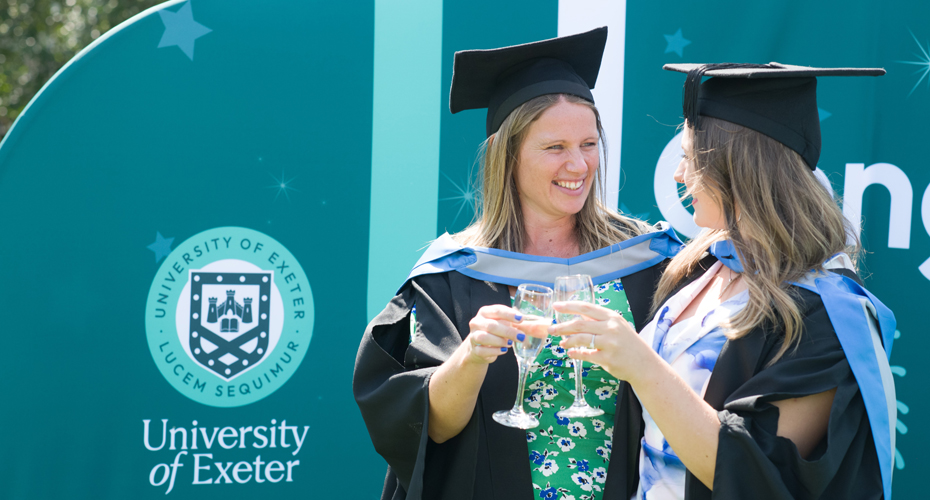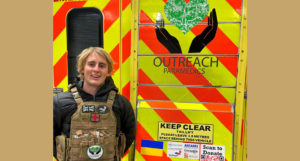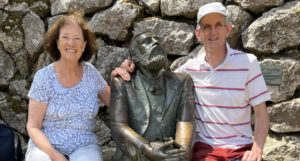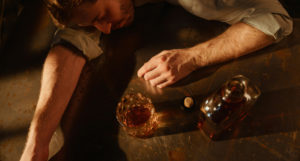Degree apprenticeship opens door to radiography careers for the first time to help fill NHS shortage

Rachael Bradford became a mother at the age of 18 when her peers were heading off to university. Now, she is among the first wave of apprentices to graduate with a degree in radiography thanks to an innovative apprenticeship at the University of Exeter.
The University of Exeter’s degree apprenticeship programme offers an alternative route to radiography with students able to work alongside their studies. It is the first course of its kind offering a full degree programme as part of an innovative “earn while you learn” model which the government is looking to roll out to reduce NHS staff shortages.
With an average age of 35 and coming from a range of backgrounds, the first cohort of students to complete the apprenticeship are embarking on their new healthcare careers as qualified radiographers.
Among them is Rachael, who would not have been able to commit to a traditional degree. She was interested in a career in healthcare, but when she looked into university study, she could not find a course with placements that would fit around family life. She was working as an assistant to the maternity ultrasound team when she overheard a discussion between colleagues about the new programme.
“I spent years working in various roles for the NHS. I started out with a job in a hospital pharmacy which was great because I got to see all the different parts of the hospital as I delivered medicines. I knew I wanted to work clinically in a patient fronted role so applied for a healthcare assistant training post that led to my role in maternity and inspired my ultrasound career aspirations.
“That’s when I overheard some of my colleagues talking about the course and I applied straightaway – it was a bit of a whirlwind application process. It’s been hard work, especially balancing home schooling during the pandemic with my university commitments and as a military spouse with my husband away from home a lot, but it’s been worth it to follow my dreams. I’m hoping to do a further course and qualify as a sonographer.”
Rachael, whose children are now nine and 14, is one of 26 students set to graduate in July, having been the first students in the country to undertake the three-year degree apprenticeship programme. The programme is the first of its kind in the country and began in 2019. Students were just getting to grips with their course when COVID hit. They continued to work clinically throughout the pandemic.
Demelza Green, Senior Lecturer at the University of Exeter, said: “There’s currently a staffing crisis among radiographers in the NHS nationally, and programmes like this really open up the door to a whole range of people who otherwise wouldn’t consider university study. This innovative programme is tapping into this demographic, where people have a huge range of life experience, which is one way we can address the shortage of radiographers we are currently facing.”
For Georgina Brimblecombe, 24, the degree apprenticeship route was ideal from a financial perspective. Despite having known she wanted to work in healthcare, she found that going to university wasn’t an option for her. Instead, she worked as a radiography assistant in a hospital, which is where she first heard about the apprenticeship from one of the managers.
Georgina said: “I had been feeling like I was stuck in my role – I couldn’t progress without a degree and I didn’t have financial backing to do the degree. Going to university this way has given me financial stability. I’ve been able to earn whilst I learn – I’ve bought a house, I’ve got a mortgage, and I’m now planning my wedding.”
Students on the apprenticeship route earn a salary while they study, and their fees are covered by the NHS.
Christine Heales, Head of Medical Imaging at the University of Exeter, said: “Having the opportunity to earn while you learn opens the course up to people from a variety of backgrounds. Students on the course have completed the same academic degree as students following the more traditional route, whilst also working in NHS hospitals across the country. We’re so proud of what this group of students have achieved.”



